Most annoying email mistakes
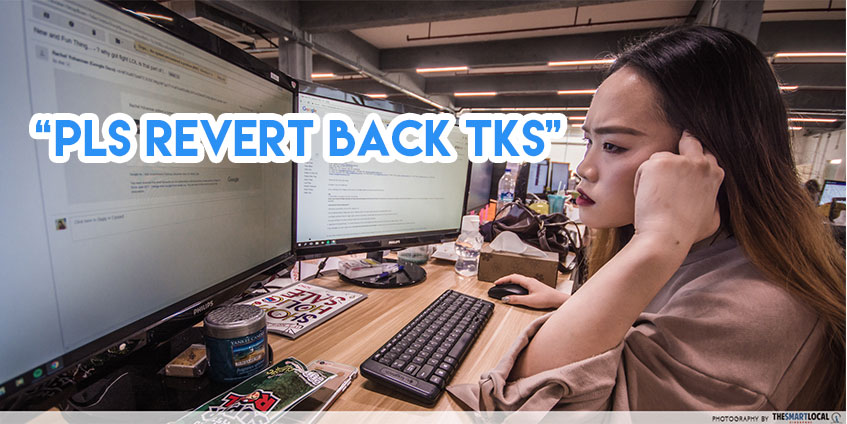
For most of us, emails are the main medium of communication to the working world outside our office. As the first form of direct contact with someone, an email says a lot about a person, and sadly, some choice of words will make you want to table-flip and facepalm at the same time.
Here are the most common, cringe-worthy email mistakes Singaporeans make, and suggestions on what you can say instead:
1. “Pls advice”

What you probably mean: You’re the expert here, so please suggest some alternatives.
What it actually means: What it actually means: Please assist to suggestion.
What to use instead: Please advise.
“Advice” is the noun referring to the suggestion that someone gave. “Advise” is the verb form, which refers to the act of suggesting something. You give advice to someone, and you advise someone. We advise that you seek advice from Google if you’re unsure.
Also, “pls” enunciates like an unprofessional “plis” instead of “please”, so spell words correctly in full.
2. “Pls revert back”

What you probably mean: Please check and get back to me ASAP.
What it actually means: Please return to your original state.

The Oxford Learner’s Dictionaries has updated the meaning of “revert” marked under “Indian English” to mean “to reply”, but in Singapore, it’s still labelled as a mistake in official correspondence. To “revert back” means to go back back – even polyjuice potion can’t do that.
What to use instead: Please get back to me on this.
3. “Nice to e-meet you”

What you probably mean: It’s nice to meet you via email.
What it actually means: I feel the need to highlight that we’re using technology to meet even though the medium already clarifies that we’re meeting electronically.
What to use instead: Great to be working with you on this project/nice to meet you.
4. “Pls expedite”
What you probably mean: You guys are really slow so I’d appreciate it if you hurry up and move with the project.
What it actually means: I’m using my impressive vocabulary to assert my authority but I want you to (please) hurry with this.
What to use instead: Please get back to me on this as soon as possible.
5. “FYNA pls” (for your necessary action / notice and action pls)
What you probably mean: Take note and do something about this because I know some of you don’t read my emails thoroughly. Tolong.
What it actually means: I don’t trust you to work independently, so I’m instructing you to take action.
What to do instead: As long as you make your emails concise, people are going to understand what they have to do. Adding an acronym at the end of your instruction doesn’t highlight it if your emails are long af.
For necessary action? For notice? Doesn’t the act of sending someone an email already imply that there’s some action to be taken?
Tip: make your emails concise, so that you won’t have to make markers like this.
6. “It’s not in my purview”
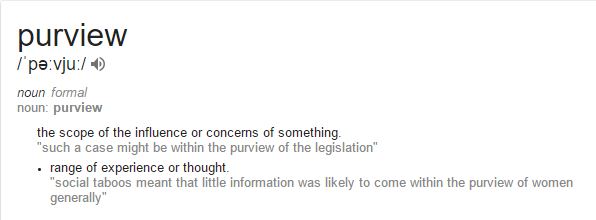
What you probably mean: This isn’t my expertise.
What it actually means: I don’t care about this because it’s not in my job scope. Get someone else.
What to use instead: I’ve cc-ed _____. He/she will get back to you on this.
7. “Just to touch base with you”
What you probably mean: Just to brief you on this
What it actually means: I wish to touch you on all your bases
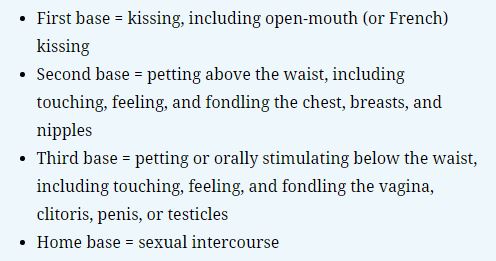
Um no you are not touching any of my bases.
What to use instead: Just to follow up
8. When emails are written like text

What you probably mean: I just want to get my message across – short and sweet.
What it actually means: I have no respect for you and I’m going to leave in the “Sent with iPhone” to show you what a busy, on-the-go person I am so don’t contact me for anything.
What to do instead: Delete the “Sent with iPhone”, open with a greeting, and sign off properly. Emails should always be consistently professional, especially when you’re applying for a job interview.
9. People who don’t sign off
What you probably mean: I thought my name would be apparent from my email.
What it actually means: You’re going to have to figure out which of my four names is the one I’d like to be addressed by. Also, you can’t contact me because I didn’t give you a number to call. You’ll also never find out what position I hold in the company. Good luck.
What to do instead: Just put in an automated sign-off, inclusive of your name, position, and contact info. As far as possible, your company logo should be visible, but not too large. Also, stay away from sign-off quotes, because:
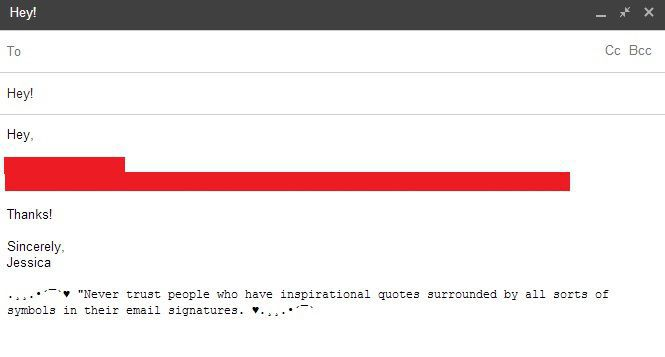
10. “Highly noted”
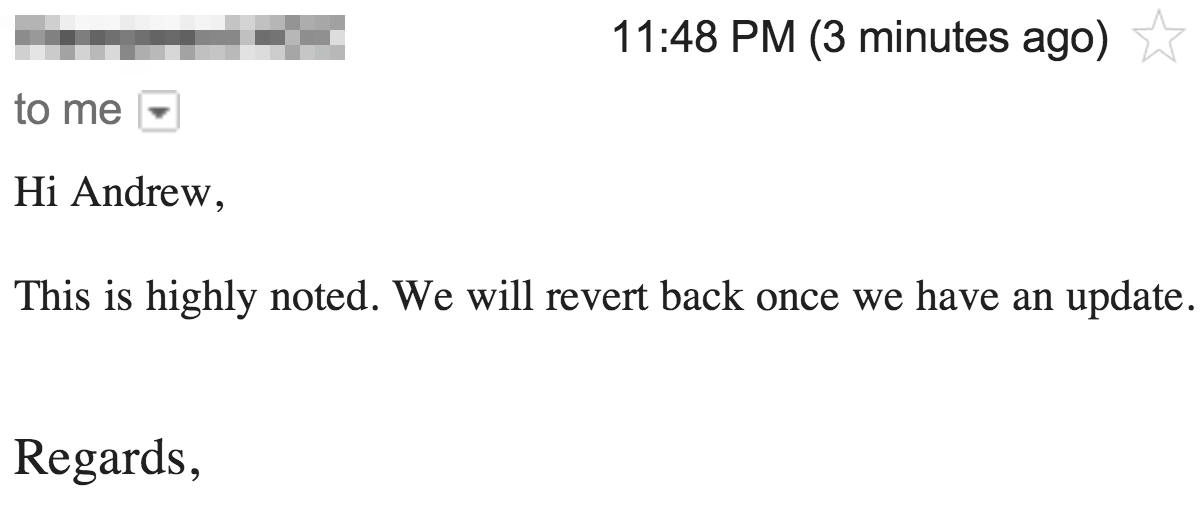
What you probably mean: I have taken note of this important piece of information.
What it actually means: ?????? I have taken note of this at a high place???
What to use instead: Got it/thanks for this/understood.
11. People who don’t keep their text formatting consistent
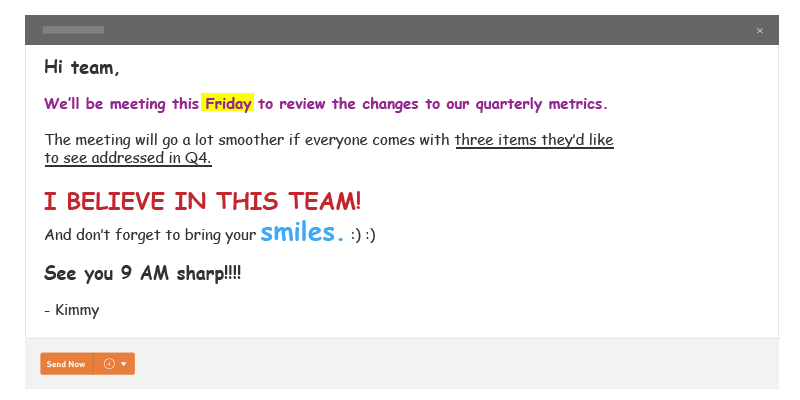
Different font, different font size, different font colour, different life.
What you probably mean: There are different things you need to take note of but everything I’ve written is important so tAKe nOte.
What it actually means: I don’t have my life together and I waste a lot of time changing fonts and font colours in hopes to motivate people to do the things I want them to do. It’s not scientifically proven but I do it anyway.
What to do instead: Again, keep your email concise. It’s easier for people to pick up on important information. Below is a rewritten version of the above email:
Hi team,
We’ll meet this Friday at 9am to discuss the changes to our quarterly metrics. Prepare three items you’d like to address in Q4 before the meeting starts.
Looking forward to your contributions!
12. “With regards to” instead of “with regard to”
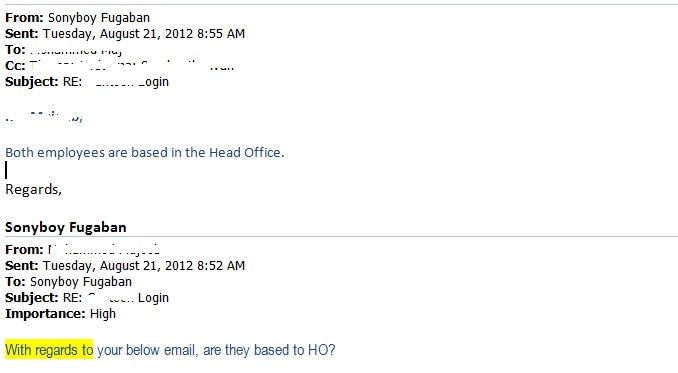
What you probably mean: Pertaining to the your previous email…
What it actually means: Send my best wishes to your below (?) email.
What to use instead: With regard to your previous email…
13. Consistently marking messages as urgent/ important

What you probably mean: I would like a reply on this as soon as possible.
What it actually means: PAY ATTENTION TO ME I HAVE NO PATIENCE AND I WANT ANSWERS NOW.
What to do instead: If your job is at stake, it’s fine to mark your email as urgent, but it should never come to a point where you have to resort to using the dreaded red exclamation mark, or “low importance”. If it’s of low importance, don’t draw unnecessary attention to it. If you need a reply, ring the person up – calls get things done much faster.
14. “Happy TGIF”

What you probably mean: Yay, it’s Friday!
What it actually means: TGIF is an acronym for “Thank God It’s Friday”. By saying “Happy TGIF”, you’re literally saying “Happy Thank God It’s Friday”.
What to use instead: Happy Friday/have a great weekend ahead!
15. “Thanks for the quick turnover”

What you probably mean: Thanks for replying so quickly.
What it actually means: Thanks for the quick employee replacement rate/thanks for the pie.
What to use instead: Thanks for the quick response.
Communicate to be understood
As the main medium for working professionals to contact each other, emails can leave a lasting impression. Rather than saturating your emails with cheem words that’ll only confuse people, it’s far easier to be understood when you use simple words in concise sentences.
Best regards,
TheSmartLocal

Drop us your email so you won't miss the latest news.








